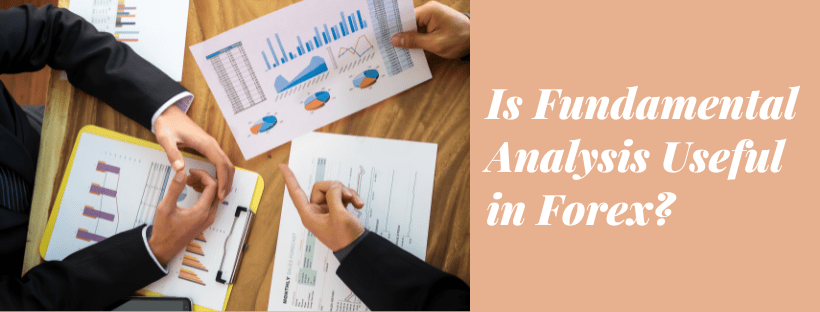The goal of this guide is to answer one simple question:
Is fundamental analysis useful in forex?
People appear to be interested in this question, as it is a phrase that is frequently searched for on Google.
So, we’re going to walk you through the topic and give you the answer.
By the end of this guide, you will know whether fundamental analysis is useful or not.
The importance of fundamentals in forex
To determine whether forex fundamental analysis is useful, we must first determine whether fundamentals are important in the first place.
To that end, let’s stop for a moment and think about what moves the forex market.
It’s supply and demand, right?
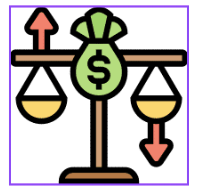
Now let’s take it a step further: what are the driving factors of supply and demand?
Are people just randomly deciding to buy and sell foreign currencies without any reason?
Of course not.
They do it because they have to, or because they want to profit from price fluctuations. And in either case, fundamentals play an important role.
For one thing, the number of people vacationing in countries ravaged by anarchy and political turmoil is rather low.
If foreigners are reluctant to visit a country, the demand for its currency will be lower compared to that of popular travel destinations.
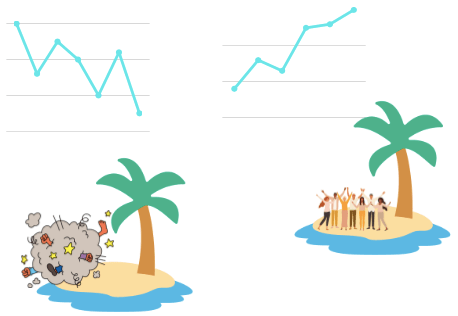
Yes, currency trading for vacation purposes is a minor force in the forex market. Yet, even at the most basic level, we can see that supply and demand is influenced by fundamentals such as political and social factors.
This becomes even more obvious when you add wealthy investors, multinational corporations, and investment funds to the picture.
Who would risk squandering hundreds of millions of dollars by investing in an unstable country?
Not too many, to put it mildly.
But this is just the criteria of where NOT to invest money. When evaluating potential candidates,large investors are also interested in what are known as “the growth prospects” of the countries in question, and as you might expect, fundamentals play a significant role in this.
So, all in all, fundamentals are important in forex, and with that, fundamental analysis has its place as well.
However, just because fundamentals might explain long-term investment flows, does the average trader benefit from considering them, or is technical analysis sufficient?
Is fundamental analysis useful in forex?
One of the key arguments of many technical analysts is that the price already includes all relevant information about the forex market.
This leads them to ignore fundamentals entirely and focus instead on what is happening on the chart.
And hey, if that sounds like you and you’re doing well in your trading, then don’t change anything.
But if you’ve been struggling, it could be your reluctance to look beyond technical analysis that’s holding you back.
On the one hand, it is true that available information is usually visible on price charts.
For example, if traders believe that Britain is performing poorly for a variety of reasons, the pound will most likely weaken against other currencies.
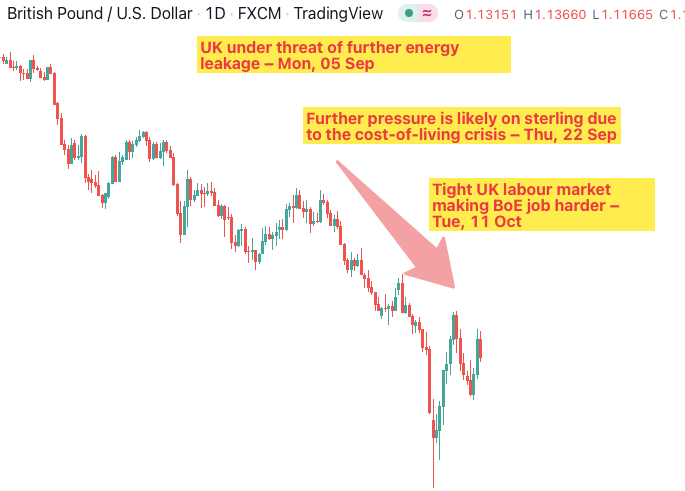
Anyone who opens a chart of a currency pair containing the pound will be able to see this tendency, even if they are unaware of the economic backdrop.
On the other hand, relying exclusively on technical analysis can make it more difficult to detect when situations change and when you should exit your short trade, for example.
Yes, you will see signs of recovery on the chart, but without understanding the economic narrative, random price fluctuations can scare you into closing your position ahead of time.
Meanwhile, if you followed the fundamentals, you would know if the pound was still on shaky ground or not and you would be able to make an informed decision.
Fundamentals can be useful not only for long-term traders, but also for day traders.
Knowing when important economic data is released will allow you to anticipate bursts of volatility and time your trading accordingly or insulate yourself from violent market swings.

This article belongs to ForexSpringBoard.com. Do NOT copy.
And if you go deeper and understand the economic landscape, market expectations, and future outlook, you will have an invaluable tool to combine with technical analysis to gain an advantage over less informed traders.
So, to summarize: Fundamental analysis is useful in forex, and if you haven’t already spent time learning about it, it’s the logical next step in your evolution as a trader.
Examples of how fundamentals can help you in forex
Buy the rumor, sell the news
This is a Wall Street classic that routinely leaves beginner traders baffled, wondering what the heck is wrong with the market.
Here’s what it looks like:
Frequently the market expects something to take place. For example, Wall Street might believe that the US unemployment rate will fall from 5% to 3.5%, which is a notable improvement.
In situations like this, it is not uncommon for the USD to strengthen significantly prior to the announcement as the market positions to profit from the release.
When the figures finally come in and meet expectations, the USD will often crumble as Wall Street traders take profits.

For the average retail trader who isn’t too involved in the fundamentals, this creates an odd situation in which they see strong employment numbers but a falling dollar, which appears to make no sense.
Had people followed the fundamentals more closely, there would be a much less room for surprises.
Take advantage of excessive positioning
So, we know that the market has a habit of predicting certain events and pricing them in ahead of time.
Sometimes, however, this prediction turns out to be a bit too extreme, and many traders find themselves overexposed (having bought too much of a currency).
As a result, they will have to rebalance their positions, and if you can spot these situations early on, you can catch some nice intraday trends.
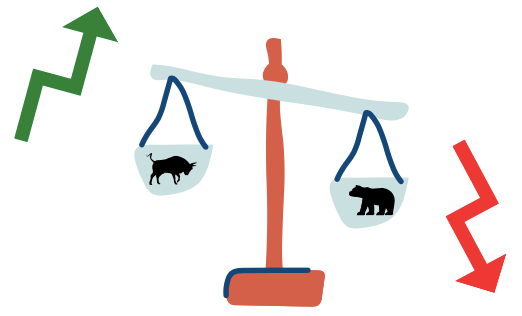
Let’s look at an example.
You know that the market expects a 1% rate hike, but you disagree. Your research led you to the conclusion that a 0.5% increase is more likely.
The chart has already been edging higher in recent days, as traders are positing for the expected 1% rate hike which most see as inevitable.
Now here comes your opportunity!
Instead of buying into the uptrend, you’re eagerly waiting for the report to be released.
Tick, tick, tick… the report comes in at 0.5%. You were right!
The market is taken aback. Algorithms will be the first to react, sending the price plummeting.
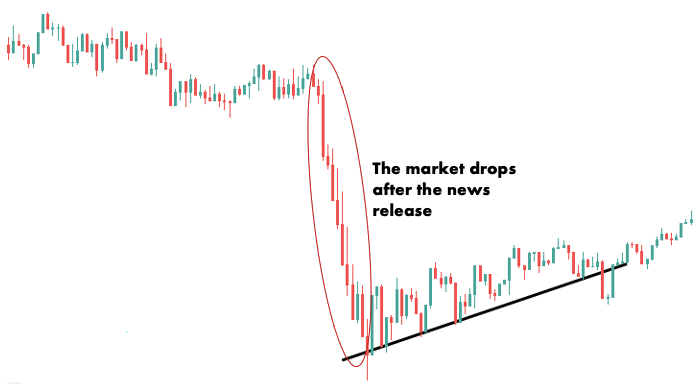
Since you are well aware of what’s going on, the moment the news hits, you know that the resulting mayhem will most likely develop into a prolonged downtrend.
Instead of duking it out with the algos immediately after the news release and risk losing money amid heightened market volatility, you can enter a few minutes later when things have calmed down.
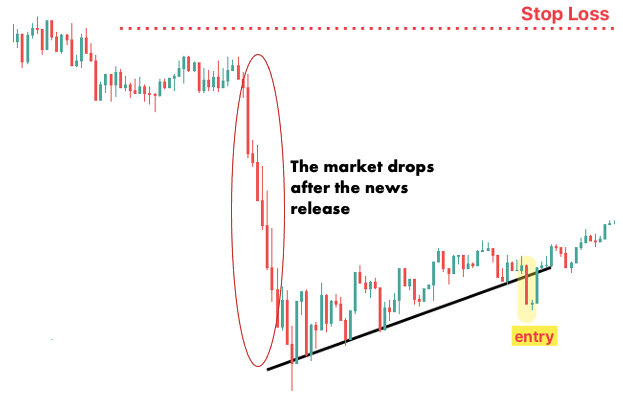
You will still be ahead of technical traders, who require more price action to declare a trend and thus will catch up only later.
Consistently following an approach like this has a very good probability of producing the differential insights required to be profitable in the long run.
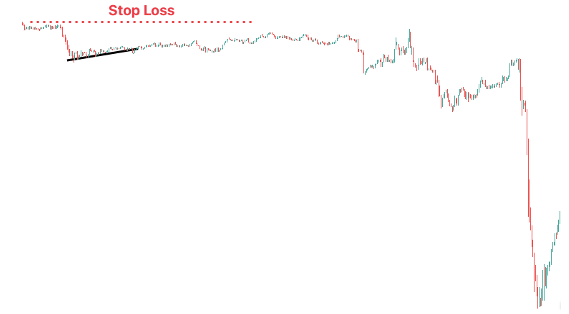
Be the first to react after an event risk is out of the way
If the first two examples didn’t convince you that fundamental analysis can be quite useful in forex, perhaps this third one will.
So, what is it all about? We’ll explain.
There are times when the market has a strong bullish or bearish bias, but traders are afraid to act on it due to a major event on the horizon.
For example, traders may be very bearish on the euro, but the ECB meeting is only a day or two away, and no one is willing to take a position just yet as there is a gap risk if something surprising happens.

(Retail traders often overlook gap risks in forex. Make sure to read our guide on gaps to understand what they are and how to cope with them.)
As soon as the meeting is over (assuming no major surprises), the euro will drop like a stone as traders finally enter the trade they had planned on all along.
If you can find similar situations, you can make a lot of money by simply putting on the position faster than others once the event is out of the way.
And how do you find these situations? Well, you already know the answer… using fundamental analysis.
Are there shortcomings to Fundamental Analysis?
Yes, fundamental analysis is not perfect.
Like other types of analysis, it can be subjective.
What fundamentals you may regard to as “utterly terrible” for a country might simply be “somewhat disappointing” for someone else.
Also, fundamental analysis suffers from a more pressing problem: its inability to supply the trader with clear entry and exit rules.
To put simply, fundamental analysis is good at explaining what should happen in the long term, but it does a bad job at explaining short-term market behavior.
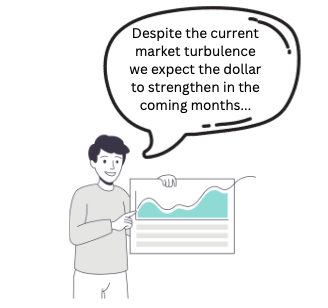
This issue can be mitigated by focusing not so much on the fundamentals themselves, but more so on how the market reacts to them.
You can get an idea of how to do that by looking at the examples we provided in the previous section.
Last but not least, fundamental analysis is very time consuming.
It’s not enough to quickly check inflation and GDP figures and skim the economic news section of the newspaper.
While this can give you a false sense of professionalism, hardly ever will it put you ahead of others.
If you want to profit from fundamental analysis, you must discover something unique that others have overlooked – a difficult task in the competitive world of currency trading.
Conclusion
We hope that this guide has convinced you that fundamental analysis has some great applications in forex.
There is an army of losing traders who place all of their hope into finding the best indicator or the winning chart pattern but who never quite put these tools into proper context.
Don’t make this mistake.
We are not saying that you should not use technical analysis, but if you are already familiar with most technical tools, it may be time to shift your focus to fundamental analysis.

